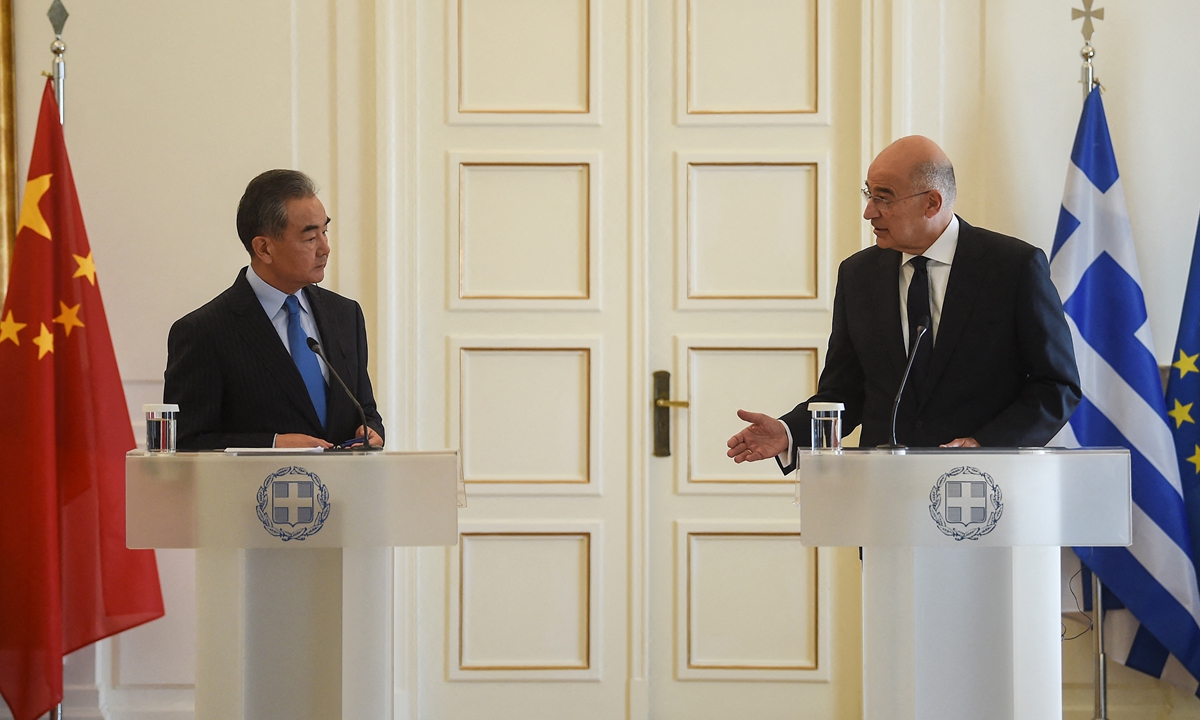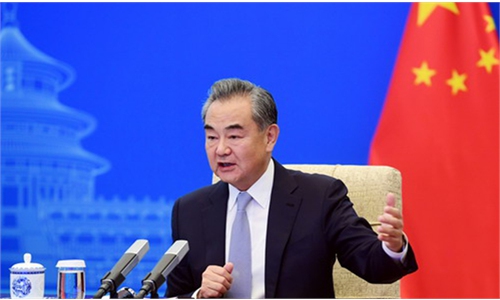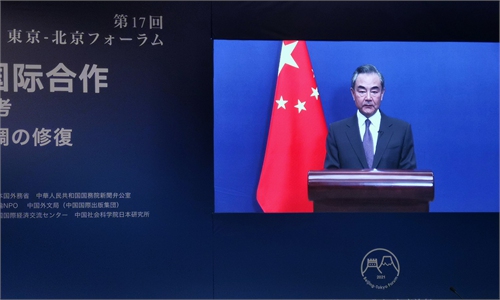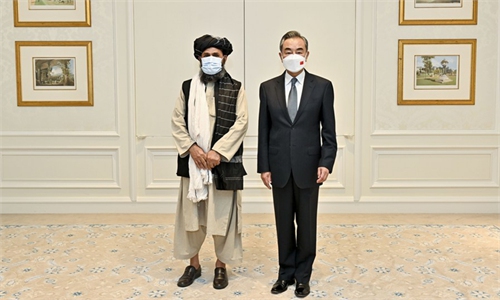FM begins Europe visit to ‘dissolve misunderstandings, stabilize ties’ in three key messages

Chinese State Councilor and Foreign Minister Wang Yi (left) and Greek Foreign Minister Nikos Dendias hold a press conference following their meeting at the Greek Ministry of Foreign Affairs in Athens, on October 27, 2021. Photo: AFP
Chinese State Councilor and Foreign Minister Wang Yi on Wednesday started his Europe tour which is taking him to Greece, Serbia, Albania and Italy. Analysts said the four stops in Europe are all regional countries that have close cooperation and traditional friendships with China, and the tour is expected to consolidate cooperation and manage differences amid recent noise in Europe.
In his first stop, Wang met with Greek Foreign Minister Nikos Dendias on Wednesday for extended talks between the Chinese and Greek delegations, which focused on strengthening bilateral cooperation with China, mainly in trade, investment, culture and tourism.
Wang said at the press conference after meeting with Dendias that he wished to convey three clear messages to friends in Greece and the rest of Europe: China hopes to carry on the Olympic spirit together with Europe; to enhance connectivity with Europe; and promote dialogue among civilizations with Europe, according to a statement on the website of the Chinese Foreign Ministry.
Beijing is ready. We are confident to present a simple, safe and wonderful Olympics to the world. The Olympic Games originated in ancient Greece and was revived in modern Europe. We welcome athletes from all countries to join the Beijing Winter Olympic Games and to promote the spirit of the Olympics, which requires mutual understanding with a spirit of friendship, solidarity and fair play, Wang said.
He also noted that politicization of sports should be rejected as it twists the purpose of the Olympics.
Wang's visits come at a time when the European Parliament just passed a resolution to heighten contact with the island of Taiwan last week and Joseph Wu, leader of the external affairs authority of Taiwan, is visiting Slovakia and the Czech Republic starting this week.
Cui Hongjian, director of the Department of European Studies at the China Institute of International Studies, said Wang Yi's visit is expected to offset the negative impact of Wu's tour and recent moves of the European Parliament. It is unacceptable that Central and Eastern Europe will become a stage of Taiwan secessionists.
Liu Zuokui, a senior research fellow on European Studies at the Chinese Academy of Social Sciences, told the Global Times on Wednesday that there are signs that some European countries are dangerously gauging China's bottom line on the Taiwan question using sausage-slicing tactics.
Since the Taiwan question concerns China's core interests, it is necessary to communicate China's stance clearly and win the support of regional partners, Liu said.
Observers noted China's bottom line allows no inch of concession, while communication and managing differences require political wisdom from both sides.
Besides Wu's visits, an economic delegation visited the Czech Republic, Slovakia and Lithuania. Lithuania announced in May it would quit the 17+1 cooperation mechanism between China and Central and Eastern Europe Countries (China-CEECs) amid a bilateral spat since early this year.
Cui told the Global Times that the foundation for China and Europe cooperation - economic and trade ties - is always there and despite political conflicts, bilateral trade continues to improve.
Official data shows trade between China and the European Union (EU) reached $599.3 billion from January to September, 2021, up 30.4 percent year-on-year. The 17+1 mechanism also saw robust development and in the first three quarters of 2021, China's trade with Central and Eastern Europe reached $629.4 billion, up 27.2 percent year-on-year.
Some differences between China and Europe are always there. But when politicians focus on differences rather than common ground, those differences are amplified and appear to be the mainstream of the relations, Cui said, noting it is urgent and necessary for China and Europe to properly manage differences, dissolve misunderstandings and stabilize and restore the healthy development of the relations.
Though conflicts concerning Taiwan island may be a rocky point of China-Europe relations, to say Wang's visit is a response to Taiwan-related provocations is underestimating the significance of the visit, experts said.
The four countries have cooperation with China on the Belt and Road Initiative, and are traditional friends and important partners. The visit will consolidate the friendship and deepen practical cooperation, Liu said.
Experts also highlighted the relations with Serbia which greatly developed during the COVID-19 pandemic, and with Albania, with which friendship "overcame differences in history, culture, ideology and political systems," Chinese envoy to Albania Zhou Ding wrote in August.
Italy was the first supporter of BRI in the G7 and has close cooperation on epidemic control with China. Amid some Italian voices against China, Wang's visit is expected to dissolve misunderstandings and enhance cooperation, Cui said, noting the two countries will also coordinate ahead of the G20 summit in Rome.



